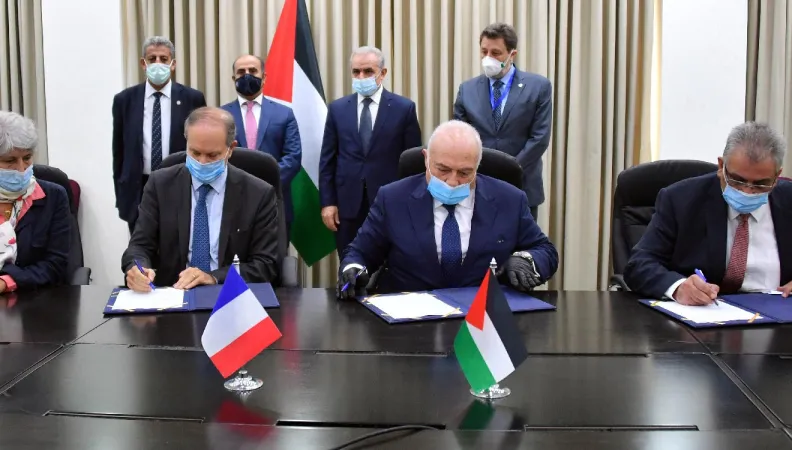Share the page

In the presence of His Excellency the Prime Minister, Mr. Mohammad Shtayyeh and Mr. René Troccaz, the French Consul General of Jerusalem, Palestine signed today a 23.7 million Euros project funded by the Green Climate Fund (GCF) through AFD (GCF is the world’s largest dedicated fund set up by the United Nations Framework Convention on Climate Change in 2010) within the framework of a 45 million euros intervention (13 million Euros from AFD have already been mobilized, with an additional contribution of 8 million Euros from Ireland). The overall project aims at reducing the impact of warmer temperatures, decreasing rainfall and increasing aridity due to climate change, by increasing the availability of alternative water resources that may be used to sustain agriculture and to increase the resilience of a highly vulnerable population in the Gaza Strip.
This funding is very important for the Palestinians as it is the first of the Green Climate Fund. The Palestinians have been working for the last 5 years to access it and France had supported their candidacy. The signature took place in the presence of Mrs. Catherine Bonnaud director of the French Development Agency (AFD ) in Palestine, Mr. Shukry Bishara, the Minister of Finance (MoF) on behalf of the PLO, Mr. Jameel Mtour, the Environmental Quality Authority (EQA), Mr. Mazen Ghunaim, the Chairman of the Palestinian Water Authority, Mr. Riyad Atari, the Minister of Agriculture and Mr. Ciro Fiorillo, Head of Office, the Food and Agriculture Organization (FAO) coordination Office for the West Bank and Gaza Strip Programme.
Water scarcity in Palestine is a main source of the population’s vulnerability, especially in rural areas. It is predicted that precipitation rates will drop by 15% by mid-century and by 23% by 2100 due to climate change. As a result, water available to the Palestinians will drop from 190 m3/capita/year (2010) to 67 m3/capita/year by 2050, leading to further deficit in the coastal aquifer, which has already marked the current situation. With combined predicted demographic growth and climate change, it is estimated that Palestine will confront a water deficit of 271 million m3 by 2020.
The project has three main objectives:
- Production of additional quantities of water for agricultural use: infiltration treatment rehabilitation and recovery facilities construction for treated wastewater from the NGEST treatment plant will be setup to supply irrigation water over an area of 1,500ha. The main objective of the Irish Aid Funding is towards the installation of a solar park (7-8 MWp), which will guarantee low carbon emissions and contribute to the energy autonomy of the entire system. Part of this park will be within the Access Restricted Area on the eastern border of the Gaza Strip.
- Development of irrigation, water efficiency and climate resilient agriculture: an irrigated area of 1,500 ha will benefit around a thousand family farms, near the NGEST wastewater treatment plant, and will be setup to provide a daily water irrigation service to all farmers in that area, who will be equipped with drip irrigation and other climate smart equipment to maximize the efficiency of the system.
- Management of the water cycle in the context of climate change and capacity building of agents: the project will align with existing institutions and the division of roles and responsibilities in Palestine. However, given the limited resources of these local actors, the project will provide them with the necessary support to effectively fulfil their missions. Particular attention will be given to the presence of women in Water User Association (WUA) governance bodies, so that their interests, particularly with regard to access to water, are protected.
“The project will benefit directly around 1,000 agricultural projects, involving over 5,000 persons, by facilitating access to quality irrigation water to irrigate an area of 1,500 hectares. Annual injection of an additional 13 million cubic meters (as compared to the baseline situation) in the groundwater will cover the needs of agriculture and will allow the release of an equivalent volume for other uses (mainly drinking water)”, said Catherine Bonnaud. This will cover 10% of the required water for the Gaza population. Furthermore, it will halt the flow of polluted water into municipal wells of Gaza City, which will prevent the emergence of a health crisis that would affect a considerable part of the population (around 400,000 inhabitants). The excess of renewable energy production from the solar park will be used for other water infrastructure in the Gaza Strip.
“This project falls within the scope of one of AFD strategic priority for the region which consists in managing shared spaces and resources in a sustainable and inclusive way. It also contributes to the adaptation of Palestine to climate change challenges”, added Catherine Bonnaud.
